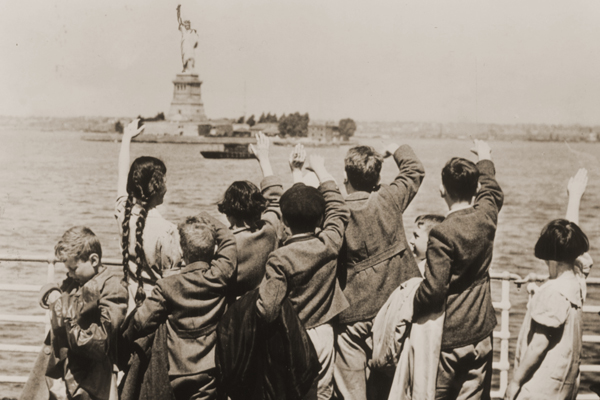
Jewish refugee children wave at the Statue of Liberty as the SS President Harding steams into New York harbor, 1939. They are among a group of 50 Jewish child refugees from Vienna who came to the United States as part of a rescue effort organized by Americans Gilbert and Eleanor Kraus. US Holocaust Memorial Museum, courtesy of Anita Willens
2024 Monna and Otto Weinmann Annual Lecture
During the Nazi regime, approximately 1,000 European Jewish youths migrated unaccompanied to the United States through organized refugee efforts. The children and their parents anticipated a painful but short-lived separation, after which the family would reunite and settle in a permanent destination. But for most, the time in transit was prolonged for years—families stranded in Europe often perished from the Nazi onslaught, while children remained housed with foster families or relatives. Join us to hear how Jewish youths framed their experiences of family separation and what these stories reveal about the history of childhood during the Holocaust.
Opening remarks
Dr. Janice Weinman Shorenstein, CEO, Education Through Music
Speaker
Dr. Daniella Doron, Assistant Professor of Jewish Studies, Colgate University
Moderator
Dr. Lisa M. Leff, Director, Jack, Joseph and Morton Mandel Center for Advanced Holocaust Studies, United States Holocaust Memorial Museum
This in-person program is free and open to the public, but registration is required.
For more information, please contact campusoutreach@ushmm.org.
The Monna and Otto Weinmann Annual Lecture honors Holocaust survivors and their fates, experiences, and accomplishments. Monna Steinbach Weinmann (1906–1991), born in Poland and raised in Austria, fled to England in autumn 1938. Otto Weinmann (1903–1993), born in Vienna and raised in Czechoslovakia, served in the Czechoslovak, French, and British armies; was wounded at Normandy; and received the Croix de Guerre for his valiant contributions during the war. Monna Steinbach and Otto Weinmann married in London in 1941 and immigrated to the United States in 1948. This annual lecture has been made possible by Janice Weinman Shorenstein.
